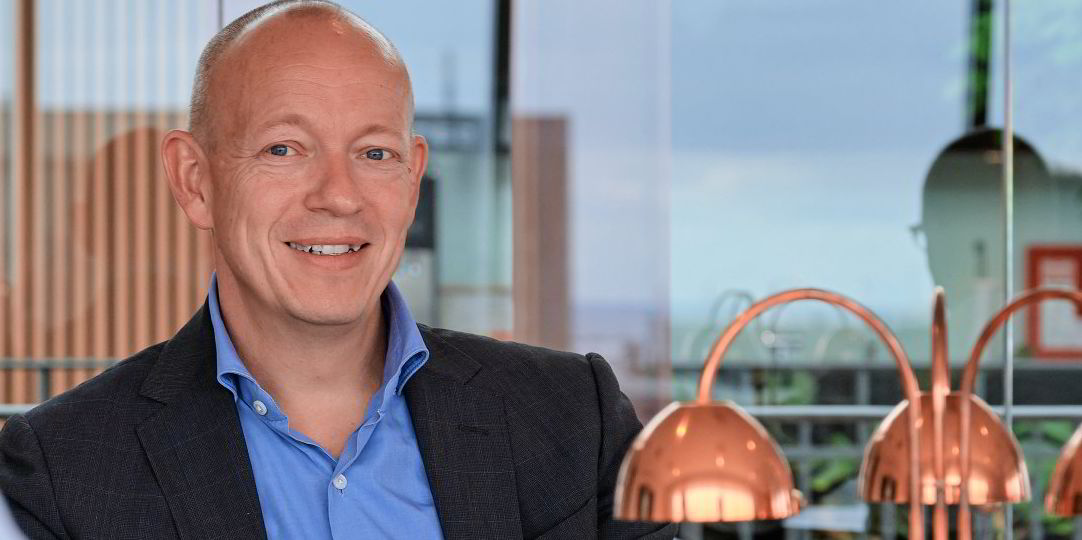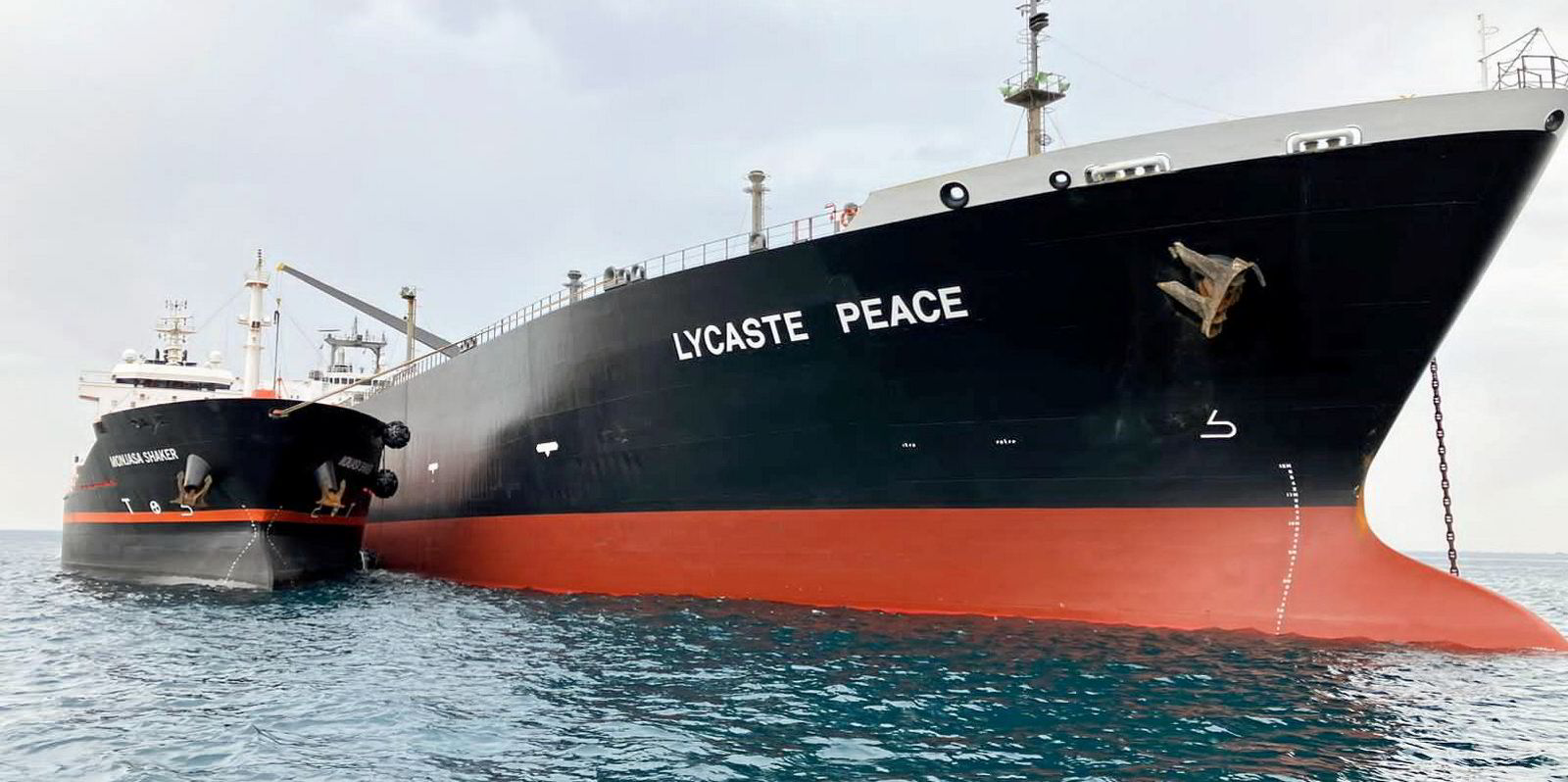If shipping wants to decarbonise, it should get out there and start now — plenty can be done today to reduce vessel emissions without resorting to ordering new ships.
That is the message from Norden chief executive Jan Rindbo, who wants to cut the hot air surrounding the topic of decarbonisation.
“A lot of times we tend to focus on what is the future fuel and how are we going to go to zero emissions by 2050 and sometimes in that conversation we forget everything that we can do now, ” he told TradeWinds.
Norden is voluntarily slowing its ships down to what Rindbo called “an optimised, economical speed”. It is also adopting fuel-saving vessel modifications, rerouting its vessels to avoid bad weather and experimenting with biofuel, among other initiatives.
“When you combine those initiatives that we’re doing now, we are actually saving 5% of our emissions in total,” he said. “And when you look at a fleet of 450 vessels, then suddenly that is the equivalent of going 100% green on 23 ships.
“If Norden was announcing today that we were ordering 23 zero-emission vessels, there would be huge headlines around that, I think. The fact is that there are smaller measures that we can do that have the same effect — and that effect is [seen] today.”
It is these emissions savings that allowed the cooperation with Teck Resources to come about, Rindbo said. The Canadian miner aims to reduce its emissions from its steel making supply chain by 25% annually by taking advantage of all the efficiency measures Norden is able to offer, as TradeWinds has reported.
The Teck cooperation coincides with ever-increasing interest from big shippers in reducing their Scope 3 emissions from value chains, per the Greenhouse Gas Protocol. But will they pay for it?
“I think we’re starting to see more companies engaging in discussions around this so there’s definitely an interest to decarbonise supply chains,” Rindbo said.
“The willingness to pay is then the next hurdle and that’s, of course, where we need to find ways of also making that cost-effective.
“That’s why we’re investing into biofuel — because we think by investing into this, that is one way we can reduce the costs for this biofuel for Norden and therefore in turn offer our customers a competitive green-freight product.”
Norden ordered six ultramax bulk carriers in June, all of which will run on conventional fuel or biofuel. The shipowner has also signed a strategic investment to buy a stake in biofuel producer MASH Makes.
“This is a new sort of direction for Norden where we actually see a need for us to invest more in the fuel supply chain and, therefore, investing into a fuel bio-oil company, where our job is to help them to convert that bio-oil into a marine bunker fuel,” he said. “The plan is to blend it with traditional bunker fuel.
“That’s obviously not the solution for the net-zero 2050 [target], but it will enable us to reduce emissions by 30% on those biofuel shipments and hopefully we can bring that to a mature state within the next couple of years.”
Rindbo is not ruling out more strategic investments in products or companies that can help Norden offer greener shipping to its customers.
“We’re not necessarily, I think, going to splash our money on this, but if there’s the right opportunity, which we felt we have with MASH Makes,” Rindbo said.
“It’s not easy to actually access biofuel and with subsidies probably moving away over the next few years, it is becoming an even more pressing matter to find access to biofuel that is priced competitively.”
Meanwhile, low water levels in the Panama Canal are a double-edged sword for Norden, which last year clocked up 250 transits through the drought-stricken waterway.
Rerouting vessels is still an expensive option, so many ships are choosing to wait, causing costs that often cannot be passed on to customers. That said, long vessel queues are helping to absorb excess fleet capacity by keeping ships at sea for longer, supporting spot rates.
“The tanker trades tend to be more spot-oriented and, therefore, you can price in more of that extra cost more immediately, but it is definitely disrupting global trade because, with increased waiting time, you now have completely different delivery times,” Rindbo said.
He sees a wider pattern of weather becoming more disruptive to global trade.
“One clear example right now is the Panama Canal, but we’ve also in the past seen lower river levels in the Rhine River in Europe and Amazon River in South America, which means that there are bottlenecks and inefficiencies that are coming in that are more climate-driven,” he said.
“Hurricanes are another example. There is definitely more weather-related disruption in global trade and shipping.”
Norden’s transshipment activities in Gabon for manganese ore have not been materially affected by the military coup after the presidential election in August, Rindbo said.
There was a 24-hour stoppage in activity, where Norden operates a loading facility for its customer Comilog, part of French mining group Eramet.
But the facility quickly returned to normal and Norden does not expect further disruptions to transshipments.
“We’re not seeing any new signals or changed attitudes or anything like that,” he said. “I think what is important here, for the country, is revenue from the commodity exports — and you could say our operation is basically the gateway for the manganese ore to be exported out of Gabon.
“I think there’s aligned interests there and in that operation continuing. So no major issues or worries. Based on what we know today and also [from] our customer Eramet, the mining company there, we are not getting any signals from them that things have changed.”




